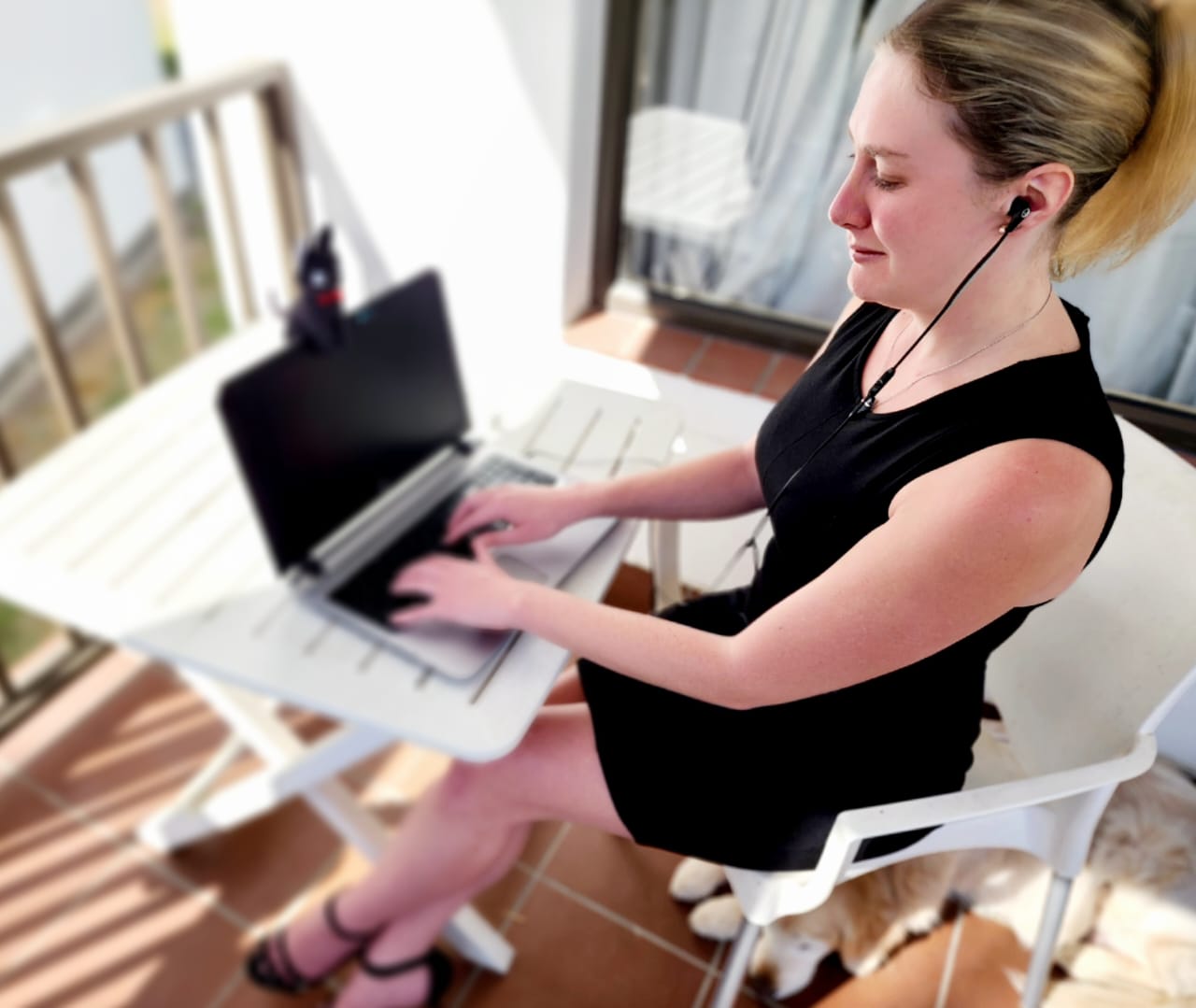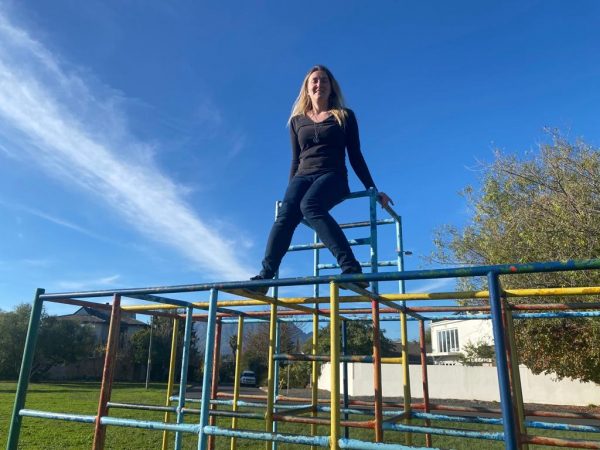This post is dedicated to David Grant, a writer, poet, artist, father, and most wonderful friend who has spread his wings and embarked upon a journey to wherever we go after this life.
I attended an international seminar in Germany in August, and my experiences there triggered much rumination on the concept of freedom, and what it means to me.
Before I get into it, I apologise for not having posted for a long time, as well as for missing out on posting on yesterday’s International Day for Persons with Disabilities. All that I can say in my defence is that I started a full-time job in October, and that, in combination with my own personal side business somewhat taking off at the same time, Masters applications, and trying to manage my time with loved ones and my own energy levels gave me very little time for fitting in anything else. In addition, this article is a very personal one, and although it covers a topic which is definitely relevant to disability, the focus is on my specific lived experience. Perhaps that is why I found it so difficult to write, and then to actually post. I tend to take a more academic, or personally distant approach when I write about disability. Anyway, without further ado, here are my thoughts on the trip, and my feelings about freedom.
Let me just start by saying that my overall seminar experience was very positive. The organisers and facilitators were all really hospitable and helpful, I met and partied with some amazing people amongst the other seminar participants, I learned about some valuable skills, techniques, best practice principles and models related to leadership, and was privileged to go on some extremely educational and fun excursions. These included a visit to the Dachau concentration camp, a hike and dinner in the Alps, and a walk up to the Andechs Monastery brewery. I am a seasoned wine drinker, but I had never managed to finish a whole pint of beer before this trip. Silly, I know, but I was ridiculously proud of finally managing that.
I think the most important thing that came from my attendance was self-awareness. I learned a lot about who I am as a leader, how I interact with others, how I react to uncomfortable or scary situations, and what it takes for me to stretch myself beyond my comfort zone.
Now, here’s where my trip was most challenging on an emotional level, and this is where freedom (or rather the lack thereof) comes in.
After a week of attending the seminar, I was exhausted. One morning, I was sitting at the breakfast table (I’m not a breakfast person, but I love those continental style breakfasts with the cheeses and cold meats!) and a group of us were talking about whether or not we intended to take the train to Munich that day. It was going to be one of the few days we had off, you see. I intended to stay at the conference centre, because each day since we had arrived had been jam packed from dawn to late at night, and I needed a breather and some time to myself. One of the other participants at my table was adamant that he would be going to Munich, despite having partied hard until the early hours the previous night. His motivation was that he doesn’t often get the opportunity to travel, so whilst in Germany he should experience as much as humanly possible. He could sleep all he wanted once he went home. He then played a pop song that had inspired him. It was called Enjoy the Ride or something, and was basically about grabbing life with both hands. It started with the phrase “we were born ready, ready to be free…”
Thinking on this interaction during the course of that day, I started questioning myself. I had just been given this amazing opportunity (I had never been to Europe before, and many people will never have the chance to go there) but yet I was being ungrateful and choosing to sit in my room. I had considered courage and resilience to be two of my greatest strengths, but could it be that I just wasn’t that brave or resilient after all? Was I no longer a daring person? Was I holding myself back by denying myself opportunities, letting life pass me by and not grabbing with both hands what was offered to me?
Self-doubt aside (a positive self-regard is something I’m currently working on) I eventually decided that staying at the conference centre was still the best decision. I would rather do fewer things and enjoy them, instead of trying to cram everything in, feeling tired and anxious, and ending up disliking my experiences. I needed some time for self-care.
Still, I continued to question myself. Why was I one of the very few people without the energy to go to Munich? Why did I often opt out of the non-compulsory activities? Besides, being the only disabled person at the seminar, I wanted to be included and feel “part of” everyone else, but now I would be purposefully excluding myself. I already felt like the “odd duck”, what with needing help from other participants to move around the conference centre, get food, take the bus to town, and make posters and fill stuff in during the sessions. I wanted to be seen as one of the people that other participants wanted to work with, to sit with, to party with. I did not want to be seen as that person who needed taking care of, until I went into my room and everyone else could relax.
Despite what my impressions had been of developed countries before I went to Germany, I still felt like the “other” there. It really didn’t seem as if the environments were much more accessibly designed, and most of the seminar work was very visually focused. Pens and paper were required in almost all of the work that we did. It was strongly encouraged that all presentations should be visual, and even more so, nonelectronic. Energiser activities, icebreakers and games nights at the seminar almost all involved movements that were shown by someone standing in front of the group. There wasn’t really time to physically show me what movements I was supposed to make, so I either half-heartedly and awkwardly did what I thought I was supposed to do and tried to draw as little attention to myself as possible, or stood back and avoided participating altogether.
Again, I am not saying any of this to shame any individual or group (as I said, most people were lovely) and this is in no way a review of the seminar, which I found to be very valuable overall. I will give constructive feedback directly to the organisers. This article is about my own thoughts, emotions and realisations regarding my behaviours in certain types of environments, and the above is just for context.
Having voiced some of the doubts I had about my character to some friends at home, they pointed out that travelling with a disability can be extremely taxing, and takes much more energy than it does for nondisabled people. There are countless things that we have to keep at the back of our minds for consideration that others don’t have to worry about.
For example, one of the activities with which I required assistance was in walking down the road a short distance away from the conference centre to the bus stop, taking the bus into town, and purchasing things there. Whilst other participants had the option of taking a bicycle, this was obviously not an option for me. Not knowing the area, I needed someone to accompany me when I wanted to go to town for necessities such as toiletries, or luxuries such as wine. As I said, there was more than enough beer available at the conference centre, but wine was definitely still my drink of choice. I would ask other participants to go with me over lunch (one of the few gaps in which there would be time to do so. However, this required whomever was accompanying me to have to give up some of their down time and to run the risk of missing lunch. Often, someone might agree to go with me the previous day when I would ask in advance, and then not actually feel like it on the day. I obviously couldn’t be annoyed at them for this, as they were giving up their own time to assist me if they didn’t need anything from town.
Sensing a little resentment from one or two people from whom I requested help, I started finding it more difficult to ask. I didn’t want to inconvenience people, and (as I’m sure is the case for many disabled people) I was terrified of being a burden. Therefore, I started strategically planning whom I would ask for assistance, trying to limit the number of times I would ask a specific individual, or at least to alternate and space it so that if I had asked one person for assistance today, I would avoid asking that same person for anything over the next few days. I would also feel quite a lot of shame for asking at all if I wanted to go to town for only luxuries, wondering if I would be judged for wanting to only buy wine, for example. I realise that this was silly, as everyone else could go to town for whatever they wanted, whenever they wanted, and nobody would judge them for what they chose to purchase with their own money.
I didn’t only have to worry about how to source my luxuries, however. One evening I ran out of toilet paper, and there wasn’t anyone at the reception desk anymore past 19:00. I requested that a participant walk with me to one of the conference centre’s other bathrooms so that I could grab a roll (this was before I had the opportunity to explore with my cane and properly learn where everything was on my own) but she said that she was too tired. She ended up giving me a hand full from her bathroom, and I had to ration it until the next day. Again, my point here is not that I was angry with the participant for not walking with me (the conference centre was very big, it was a long way to the bathroom, and it wasn’t her responsibility) but I realised then the value of not having to worry about how often you go to the bathroom in case you run out of toilet paper. These are things that nondisabled people probably never have to even think about. They would have been able to go to one of the other bathrooms on their own, without depending on someone else, so failing to have checked their toilet paper supply before the people at reception were off duty would not have been an issue.
After considering all of this in relation to what my friends said about travelling with a disability, I started feeling better about my choices regarding down time. In a way, I was just setting healthy boundaries for myself, and by ensuring that I made time to manage my own anxieties, I was also ensuring that I would enjoy the activities in which I did end up participating, as I said earlier. If that meant that people would make judgements about me, then so be it.
I have come to the conclusion that I try way too hard to prove myself to others, and to a greater extent, to myself. This is definitely related to my disability, as it has been subconsciously instilled in me by society from a very young age that people will not see my value, and that it is on me to show my value-add (or at least how I will not be a liability) in everything I do. I have always been aware that this was the case in situations involving potential or current employment, but I think it hit home when I was in an environment that involved social interaction with new people who are not already established parts of my close friendship group. This is probably also why I have always had trouble with teamwork.
So how does all of this relate to freedom? Well, on the most basic level, I came to the realisation that I hardly ever have the freedom to decide things without considering the social perceptions that will result from those decisions. I couldn’t even decide whether or not to go to Munich without judging myself, and questioning my entire character. On a deeper level, it relates to another thought that I had during that breakfast conversation that included listening to the song about being born ready to be free and enjoying the ride. Nondisabled people often don’t recognise that they are privileged when it comes to their freedom. To them, choosing to be free is simple. If there’s an opportunity that costs them very little, there’s absolutely no reason they shouldn’t take it. For me, opportunities can hold costs that they don’t hold for others. It can be difficult to enjoy the ride if you’re not entirely sure how you’re going to find the bus.
The experiences that I’ve described in this article are only a few examples of how for some, freedom isn’t a choice. I was beating myself up for not taking advantage of all of the opportunities that were presented to me through this larger opportunity (the opportunity of attending this seminar in Germany) and I was beating myself up for feeling anxious and unhappy at times, because I perceived it as ungrateful. But here’s the thing: When one has freedom, one doesn’t have to spend energy thinking about and planning around the lack thereof, and can focus on the opportunities and the many things one could choose to do.
This reminded me of one of my favourite poems by Maya Angelou, called Caged Bird. It describes the opposing experiences of two birds. One is free, and can fly anywhere it wants, and its thoughts are full of everything it could do if it so pleases. It doesn’t think of freedom. It just “dares to claim the sky.” The caged bird (with its clipped wings and tied feet) isn’t thinking of “the trade winds soft through the sighing trees”, or “the fat worms waiting on a dawn bright lawn”. It doesn’t know these things. It can hardly see through the bars of its cage, its frustration and its anger, and all it thinks about is freedom, which is why it sings.
Angelou wrote this as a metaphor for the experience of oppression as a black person in America, versus the privilege and entitlement of the unoppressed. However, I believe that the metaphor of the caged bird can be extended or interpreted to apply to any marginalised group, including people with disabilities trying to navigate social and physical environments which are not built with them in mind.
I’m not entirely sure what the moral is of this story. I suppose that, for me, it just allows me to understand some of the ways in which I react a little better. It also highlights the dichotomy between what one person perceives as freedom, versus how I see it. Most might think that the opportunity to have all these different experiences abroad is freedom, and yes, I was absolutely privileged to be able to do that. But to me, the grater experience of freedom is in the autonomy that I have at home. I am not reliant on the time, preferences or kindness of others when I need groceries. I can just order them for delivery. I have networks of people that I trust, and friends with whom I never worry about being a burden. They are my people, and they depend on me for things too. I can operate my own coffee machine when I want espresso, and don’t have to ask for assistance with inaccessibly designed vending machines. I know my environment, so I can walk to a friend’s place, Uber or walk with my guide dog to a restaurant, or go to the pool in my apartment complex when I please. This is not necessarily because everything at home is so much more accessibly designed. It’s just because of familiarity, and because this is where I have already built a network. I have learned a lot about operating from outside my comfort zone in Germany, and I’m absolutely glad that I went and that I pushed myself, but that comfort zone certainly is appreciated. A comfort zone is not an inherently bad thing. Sometimes, I am less caged inside of it than I am on the outside.
Finally, I once again want to acknowledge that expressing anger and frustration is a normal response to feelings of confinement. No, I’m not angry and frustrated all the time. Far from it. And when I am angry and frustrated, it isn’t always aimed at any specific person. It’s just that, like the caged bird that sings “for things unknown but longed for still”, I address exclusion, marginalisation, and other uncomfortable topics because it is my way of singing of freedom.





